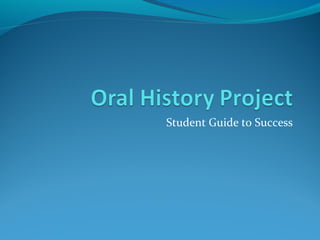
Oral history project
- 1. Student Guide to Success
- 2. Tasks Create an oral history project Interview a person who participated in or witnessed an event or era in American history Create and use a list of interview questions Collaborate with other students to review all sets of questions Use the information to create a product to demonstrate your understanding of that person’s experience Collaborate with other students to improve each person’s final product
- 3. Step 1: Pick an event or era from before 1990 Great Depression Watergate World War II Great Society McCarthyism Three Mile Island Korean War Reagan Revolution Assassination of J.F.K Stagflation of the 1970s Cuban Missile Crisis Iran Contra Scandal Civil Rights Movement Fall of the Berlin Wall Vietnam War
- 4. Step 2: Pick a person to interview Make sure It is someone you know. Relative Family friend Neighbor The person is over 18. They have participated in or witnessed an event or era that you want to research. You complete the parental permission form.
- 5. Step 4: Develop 15 questions for your interview. Your questions should Demonstrate a clear understanding of the time period. Show evidence that your researched the topic Probe the interviewee to give responses that require elaboration Stay away from questions that result in yes or no responses. Collaborate with other students to improve your questions and their questions Although your interview and topic are different, constructive feedback at this step helps everyone.
- 6. Design questions around some of these categories Entertainment/Media Employment/Occupations Community Life Family Life Accomplishments Event/era’s impact on community Event/era’s impact on the interviewee’s life Event/era’s impact on the nation
- 7. To Consider When Developing Questions… 1. Ask easy questions first, such as brief biographical queries. Ask very personal or emotionally demanding questions after a rapport has developed. End as you began, not with bombshells, but gently with lighter questions. 2. Do plan the topic and form of your first substantial question after the "settling down" phase. Ask a question that will prompt a long answer and "get the subject going." 3. Unless you want one-word answers, phrase your questions so that they can't be answered with a simple "yes" or "no." Don’t ask, "Were you a farmer in Buckingham during the 1930s?" Ask instead, "What was it like farming in Buckingham during the 1930s?" Ask "essay" questions that prompt long answers whenever you can. Find out not only what the person did, but also what she thought and felt about what she did.
- 8. To Consider When Asking Questions… 1. Ask easy questions first, such as brief biographical queries. Ask very personal or emotionally demanding questions after a rapport has developed. End as you began, not with bombshells, but gently with lighter questions. 2. Ask questions one at a time. 3. Allow silence to work for you. Wait. 4. Be a good listener, using body language such as looking at the interviewee, nodding, and smiling to encourage and give the message, "I am interested." 5. If necessary, use verbal encouragement such as "This is wonderful information!" or "How interesting!" Be careful, however, not to pepper the interview with verbal encouragement such as "uh-huh," said at the same time that the interviewee is speaking.
- 9. To Consider When Asking Questions… 1. Ask for specific examples if the interviewee makes a general statement and you need to know more. Or you might say, "I don't understand. Could you explain that in more detail?" 2. Ask for definitions and explanations of words that the interviewee uses and that have critical meaning for the interview. For example, ask a Vietnam veteran what he means by Vietnamization. What was it ? What was its purpose? 3. Rephrase and re-ask an important question several times, if you must, to get the full amount of information the interviewee knows. 4. Ask follow-up questions and then ask some more. 5. Be flexible. Watch for and pick up on promising topics introduced by the interviewee, even if the topics are not on your interview guide sheet.
- 10. Step 5: The interview Listen to the person’s responses. Ask appropriate follow-up questions. Keep a record of your person’s responses. Detailed notes or A sound recording
- 11. Step 6: Create a final product Shows understanding of the interviewee’s experience in historical context Be reviewed by members of your group for constructive feedback. Options for your final product A detailed thank-you letter to the interviewee (3 single-sided, double-spaced typed pages in proper letter format) A PowerPoint presentation- 15 slides presented to the class A Podcast Video/Movie A short narrative/biography (3 single-sided, double-spaced typed pages) Ask me if you have other ideas
- 12. Products should: Demonstrate an understanding of the historical event or era Incorporate specific information from the interview Place the interviewee’s experiences in historical context Be interesting and engaging to the audience Demonstrate effort and quality work
Hinweis der Redaktion
- Adapted from http://dohistory.org/on_your_own/toolkit/oralHistory.html#QUESTIONS
- Adapted from http://dohistory.org/on_your_own/toolkit/oralHistory.html#QUESTIONS
- Adapted from http://dohistory.org/on_your_own/toolkit/oralHistory.html#QUESTIONS